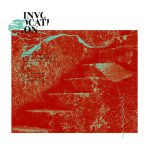THE [LAW-RAH] COLLECTIVE / CINEMA PERDU – INVOCATION
Since 2000, The [Law-Rah] Collective has been operating in various formations on different projects. Their discography boasts 14 full albums and numerous other projects. Bauke van der Wal is the constant factor of this ever-changing group of contributors.
On this occasion, he is the single [Law-Rah] member performing. Other tracks on this split album are performed by Martijn Pieck – who has been releasing his work as ‘Cinema Perdu‘ since 2012. In times, he was a member of the collective too. So, in a way, this album can be seen as a ‘collective’ effort, too. Each performer delivers two solo tracks, and they perform together on ‘Invocation 4’.
According to the liner notes, this album is all about friendship. Or rather: the ways friendship can end.
It’s also about friendships that never end, ‘even when said friend has left this dimension. The feeling that we’re left with is just about the worst feeling ever…’
The tracks on Invocation are ‘personal views and interpretations of the emptiness that remains. Finding closure in a process of grief’.
The extended, minimalist drones clearly do not radiate happiness – but on the other hand you would probably have a different interpretation of these sounds when you didn’t know about the artists’ intention. Drones like this create their own vast space to let your thoughts wander to whatever occupies your mind.
With an average length of about 10 minutes each, these five tracks are the kind of sonic immersion that makes time stand still, while everything outside the space it creates seems to disappear. At the same time, the sonic space is filled with sparse details, accents that seek attention and can keep the listener focused and avoid drifting off too far. Especially on the collaboration track, Invocation 4, which has a more industrial feel and is less ‘droney’ than the other pieces.
Van der Wal and Pieck each have their own approach but they obviously share the same artistic vision too. That is why they fit together very well on this split release that feels like a single album instead of being two completely different parts.

CELER – TWO DAYS AND ONE NIGHT
Coincidentally, Celer‘s Two Days And One Night is another album about loss and dealing with grief. On this album, Will Long retraces the steps his great-uncle travelled in 1984, from Tunis to Hammamet, ‘where he rented a hotel room, bought swimming trunks, and by the afternoon had drowned in the ocean.’ He was 80 years old.
Celer re-creates this trip using his own experience, ‘a re-imagining of what my great uncle might have heard and experienced 31 years before.’
The ambient washes of sound in the longer tracks are merged with shorter – sometimes almost inaudible – local field recordings, creating a dreamlike and slightly exotic atmosphere.
It is amazing how personal Celer‘s music feels, considering his enormous output. But, as personal as its background is, this music tells a story everyone can relate to somehow.
“It’s a shame he didn’t see the burnt orange sunset swirling over the horizon as I did… but then again, maybe he did.”
VVOLK – BOOK OF AIR
Think of a group of 18 improvisers ‘with roots in jazz and classical music’ performing. What sound do you expect to hear? Personally, I expected mayhem, pandemonium, ‘organised chaos’ and disruption.
So much to my surprise, this music is none of that. Or maybe it is, but in a completely unexpected way.
In these two pieces, each referring to two seasons of the year, the Book of Air collective demonstrates an almost incredibly controlled restraint. This is especially fascinating considering they do not use electronic instruments: the ensemble features drums, bass, guitars, harmonium, euphonium, rhodes, saxophones, flute, percussion and kankles.
I’m not sure what the title, Vvolk, refers to exactly (*). But maybe it’s the VV is the ancient notation for W – in which case it translates to “cloud”.
The music originates from the questions Book of Air asked themselves:
“what are the possibilities in playing music, when changes in this music pass by unnoticed? How do we as musicians relate to the running time of a performance? How does our hearing and memory react to these slow changes?”
Vvolk is the follow-up to Fieldtone from november, 2015, on which Book of Air performed as a quintet created music dedicated to ‘roomtone‘: “the ‘silence’ recorded at a location or space where no music is played or dialogue spoken’.
Check that one out too, if you can. You’ll probably have a hard time finding any better ‘ambient jazz’ than this.
(*) [Edit august 2018]:
Only recently I found out that Book of Air is the name of the ongoing project series, and thus not the ‘band’ name.
Fieldtone and Vvolk are the two different collectives that perform the first two parts of this series. I left the text above as I wrote it in 2016.

![[Law-Rah] Collective/Cinema Perdu; Celer; Book of Air](https://www.ambientblog.net/blog/wp-content/uploads/2016/06/SQ05_front-900x250.jpg)
![[Law-Rah] Collective/Cinema Perdu; Celer; Book of Air](https://www.ambientblog.net/blog/wp-content/uploads/2016/06/SQ05_front-244x250.jpg)


